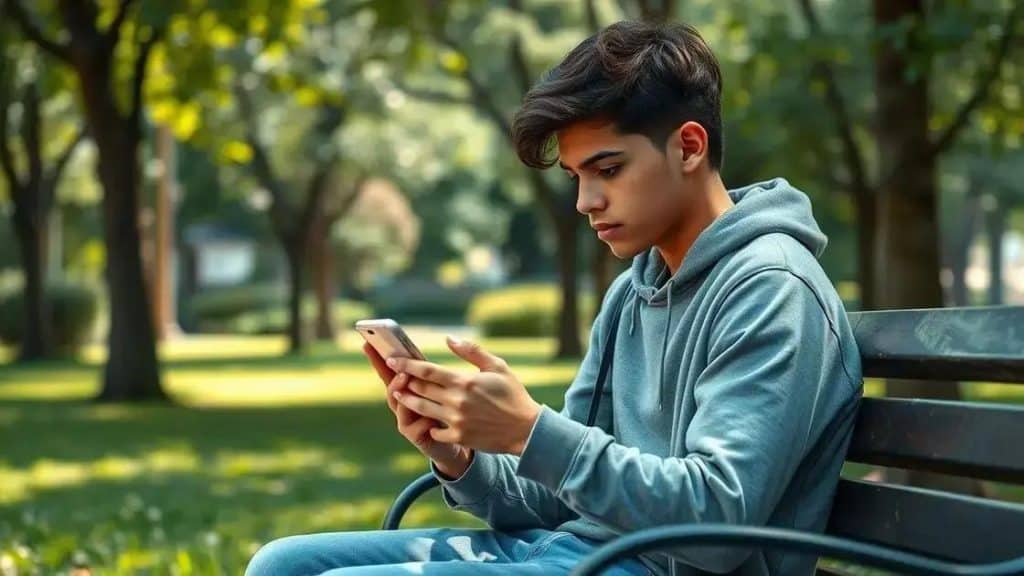Social media impact on youth mental health

Anúncios
The social media impact on youth mental health includes benefits like connection and expression, but also risks such as anxiety and cyberbullying, emphasizing the need for healthy engagement strategies.
Social media impact on youth mental health is a conversation worth having. With so many young people engaging online daily, what does this mean for their emotional well-being? Let’s dive into the many facets of this topic.
Anúncios
Understanding the relationship between social media and mental health
Understanding the relationship between social media and mental health is essential, especially for youth. Everyday, teens are logging into platforms like Instagram and TikTok. These experiences can shape their feelings in both positive and negative ways. Let’s explore how these connections work.
The Positive Influence of Social Media
Social media can create a sense of community among young people. When used wisely, it serves as a platform for sharing experiences and finding support. Some benefits include:
Anúncios
- Connection: Adolescents can connect with others who share similar interests.
- Expression: Social media offers a space for self-expression and creativity.
- Information: Teens can access a wealth of information about mental health.
When young people see others sharing their stories, it can empower them to speak up about their own struggles. This can contribute positively to their mental health.
Negative Effects of Social Media
On the flip side, social media can also bring challenges. The pressure to portray a perfect life can lead to feelings of inadequacy. For instance, constantly comparing oneself to others online may result in:
- Depression: Feeling low due to unrealistic expectations.
- Anxiety: Worrying about appearances or how others perceive them.
- Isolation: Spending too much time online can lead to real-life disconnection.
These factors highlight the need for awareness and understanding. Encouraging young people to take breaks or seek help can often mitigate these negative impacts.
Overall, understanding the relationship between social media and mental health requires a balanced view. It is crucial to recognize the potential risks while appreciating the positive aspects. By fostering healthy social media habits, youth can use these platforms to enhance their lives rather than hinder their mental well-being.
Positive effects of social media on youth
 Social media has become a part of everyday life for many young people. When used positively, it can profoundly impact their lives. There are numerous ways in which social media supports youth, helping them connect and grow. Understanding these positive effects helps illuminate how these platforms can contribute to mental well-being.
Social media has become a part of everyday life for many young people. When used positively, it can profoundly impact their lives. There are numerous ways in which social media supports youth, helping them connect and grow. Understanding these positive effects helps illuminate how these platforms can contribute to mental well-being.
Building Connections
One significant benefit of social media is its ability to foster connections. Young people can communicate easily with friends and family, regardless of distance. Platforms like Snapchat and WhatsApp allow them to stay in touch, share experiences, and feel connected. These interactions can lead to:
- Friendship: Strengthening existing friendships and forming new ones.
- Support: Finding emotional support from peers during tough times.
- Community: Joining groups that advocate for shared interests or causes.
This connectivity can create a sense of belonging, which is vital for emotional health.
Encouraging Self-Expression
Through social media, young people can express themselves creatively. Platforms like Instagram and TikTok allow them to share their talents, thoughts, and interests. This self-expression is essential for their identity development. When they share their work, whether it’s art, music, or writing, they may receive encouragement and feedback. This can boost their self-esteem and confidence.
Social media also enables youth to explore their identities. They can learn about different cultures, lifestyles, and perspectives, expanding their worldview. Exposure to diverse voices and stories can inspire them to embrace their uniqueness.
In addition, participating in online challenges or movements can promote positive change. Many young people get involved in advocacy for mental health or social justice, empowering them to enact change and feel purposeful.
The positive effects of social media are significant. As young people engage online, they can build connections and express themselves in meaningful ways. Encouraging responsible use helps ensure they reap the benefits while being aware of potential downsides.
Negative consequences of social media usage
While social media offers many benefits, it can also have negative consequences for young people. These effects can significantly impact their mental health and overall well-being. Understanding these challenges is vital for both youth and their guardians.
Pressure and Anxiety
One major issue that arises from social media use is the pressure to present a perfect image. Young people often feel they must showcase an ideal version of themselves. This constant comparison can lead to:
- Increased anxiety: Worrying about likes and followers can create a stressful environment.
- Body image issues: Seeing edited photos may lead to dissatisfaction with one’s own appearance.
- Fear of missing out (FOMO): Observing friends participating in activities can increase feelings of exclusion.
This pressure can affect self-esteem and contribute to mental health issues.
Cyberbullying and Harassment
Cyberbullying is sadly common on social media platforms. Young people may experience bullying from peers online, which can have serious emotional effects. Victims of cyberbullying often face:
- Feelings of isolation: Being targeted can lead to loneliness and withdrawal from social situations.
- Emotional distress: Victims may experience anxiety, depression, or even suicidal thoughts.
- Academic issues: The emotional turmoil from bullying can affect focus and performance in school.
Recognizing the signs of cyberbullying is crucial for intervention and support.
Young people engaging with social media should be encouraged to take breaks. Spending too much time online can result in feelings of loneliness, despite being connected digitally. Establishing healthy boundaries around social media usage helps maintain a balance and promotes mental well-being. Additionally, it is essential for parents and guardians to communicate openly about challenges related to online activity. Using social media responsibly can mitigate many of these negative effects while allowing youth to enjoy its positive aspects.
Strategies for healthy social media engagement
 Engaging with social media can be positive when done mindfully. Developing strategies for healthy engagement helps young people make the most of their online experiences while staying mentally fit. Adopting these practices can lead to a more enjoyable and balanced social media experience.
Engaging with social media can be positive when done mindfully. Developing strategies for healthy engagement helps young people make the most of their online experiences while staying mentally fit. Adopting these practices can lead to a more enjoyable and balanced social media experience.
Setting Boundaries
One key strategy is to set clear boundaries around social media use. Young people should consider limiting their screen time. A few effective ways to manage this include:
- Time limits: Decide how much time to spend online each day.
- Specific times: Choose certain times to check social media, like after homework or chores.
- Device-free zones: Have areas in the home, like the dinner table or bedrooms, where devices are not allowed.
These boundaries can help maintain a healthy balance between online and offline life.
Curating Content
An important part of a healthy social media experience is curating the content users see. Young people should actively follow accounts that inspire or educate them. This can boost their mood and provide valuable insights. Some tips for curating content include:
- Follow positive influencers: Seek out accounts that promote mental health and well-being.
- Unfollow negative accounts: Remove accounts that cause stress or promote negative self-image.
- Explore diverse voices: Engage with different perspectives to broaden understanding.
By focusing on positive content, youth can create a more encouraging online environment.
Additionally, practicing digital detoxes can be beneficial. Taking regular breaks from social media allows young people to recharge. During these breaks, they can focus on hobbies, exercise, or spending time with family and friends without the distractions of online notifications.
Promoting open conversations about feelings related to social media use encourages young people to share their experiences. By doing so, they can support one another and develop healthier habits through shared understanding.
FAQ – Frequently Asked Questions about Social Media Impact on Youth Mental Health
What are the positive effects of social media on youth?
Positive effects include building connections, enhancing self-expression, and providing access to supportive communities.
What negative consequences can arise from social media usage?
Negative consequences may include increased anxiety, pressure to appear perfect, and risks of cyberbullying.
How can youth engage with social media in a healthy way?
Youth can set boundaries for usage, curate their content, and take regular breaks to maintain mental well-being.
Why is open communication important regarding social media?
Open communication helps youth express their feelings about social media and seek support, fostering healthy habits.





